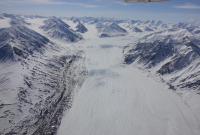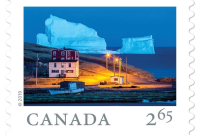Support strong Canadian climate journalism for 2025
Experts say a unique, cave-like tunnel formed by a retreating Yukon glacier remains a popular tourist attraction but is no longer safe to enter and may collapse soon.
The Kluane ice cave, about 170 kilometres west of Whitehorse, has been attracting visitors for years, but the Yukon Geological Survey is now warning adventurers not to walk under the huge, bluish ice arch.
Geologist Jeff Bond says the cave has shown serious instability in recent years and has become a hazard.
Slabs of ice weighing hundreds of kilograms routinely crash from the roof and Bond says that could be an indication of a structural shift caused by subterranean motion.
Experts believe the cave was carved by water flowing under the once massive glacier, but the arch remained as the ice receded toward Mount Archibald and the Kluane ice fields leading to Mount Logan, Canada's highest peak.
Skiers and snowshoers were able to wander the length of the ice cave, especially in winter, but Bond says it will never be safe again.
"It will only become stable, I think, when it collapses and there is no more tunnel left," he said.
"When we visited it last year it was pretty apparent that there was ongoing ice collapsing off the ceiling within the tunnel throughout the winter and the summer."
The site spans a creek bed about 13 kilometres outside Haines Junction,
The curious are urged to visit but are reminded to stay well clear of the entrance because of the unpredictable conditions. (CKRW)





Comments